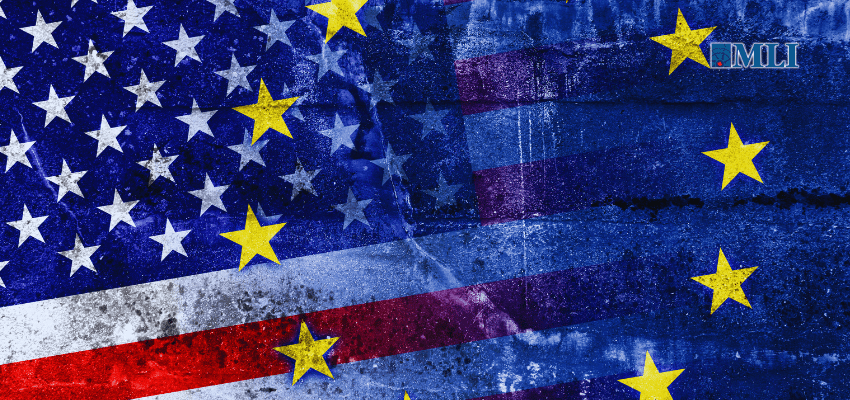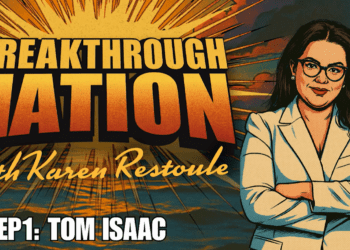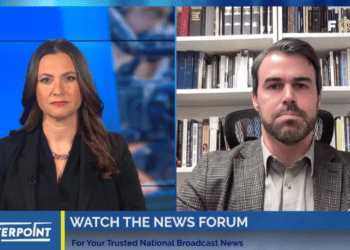This article originally appeared in The Hub.
By Richard Shimooka, February 10, 2025
President Trump’s threats to impose tariffs on imported Canadian goods have shaken the country’s political and governing class to its core. Canadian politicians, policymakers, and commentators have been scrambling to outline a response appropriate to the level of risk the country is suddenly facing. Unsurprisingly, the most common suggestion is to diversify Canada’s foreign relations away from the United States. There’s even misguided talk of Canada joining the EU.
This is far from a new impulse. For decades, policymakers have searched for counterweights to the all-encompassing power, economic and otherwise, wielded by the U.S.
When it comes to defence, this mindset is understandable—and impossible to implement. For reasons both within and outside Canada’s control, the country’s foreign policy future will lie in strengthening our continental security ties with America. Fortress North America, not NATO, will be the priority moving forward.
How we got here
Historically, Canada has tried to balance its relationship with its much more powerful southern neighbour by broadening its security relationships—the most important being with NATO in Europe. Canada was, after all, an original signatory of the North Atlantic treaty and, for much of the Cold War, a steadfast member.
NATO’s influence on Canadian defence policy was outsized and arguably even greater than America’s was. This was in large part due to the threat posed by the Soviet Union towards Europe, which was the main threat environment. NATO, a collective security organization was viewed as the main vehicle to organize Canada’s contribution to the challenge. Major force structure decisions were made in light of NATO’s requirements in Europe, and any changes would be cleared with Brussels.
For example in the late 1950s, when the Royal Canadian Navy was considering the creation of a submarine service. This would have required the reduction of four destroyers embarked on NATO duties in the North Atlantic in order to man and maintain the new vessels. Ottawa had to go to the alliance and gain permission for the shift in resources—illustrating just how integral the alliance’s European priorities were.
The only serious discontinuity between Canada and Europe during the Cold War occurred during Pierre Elliott Trudeau’s tenure in the 1970s, which sought to pull away from NATO and the Western alliance structures and find an alternate approach for Canadian foreign policy. Trudeau withdrew the Canadian Forces’ nuclear role and reduced the size of its military commitment to Europe. His government focused more on Canadian domestic security and the third world, including building relationships with the non-aligned movement and working to reduce conflict there.
Furthermore, the 1972 foreign policy white paper introduced an economic element to trade diversification, known as the third option. This saw a clear move away from the United States and towards other major and emerging economies in Europe, Japan, and the developing economies of the global south.
While the outcomes of these efforts were mixed, the rebalancing of Canada’s broader foreign, defence and trade policy never really materialized. Nevertheless, the endeavour introduced a series of concepts for foreign policy that later Liberal governments would seek to emulate. They spoke to an ideal of Canada as an independent middle power that could sit somewhat astride from the prevailing dynamics of international security—namely the superpower conflict. While some lip service was paid to this view, it was largely accomplished by curtailing capabilities for foreign commitments, chiefly our NATO commitments.
Overall, Trudeau senior’s erosion of Canadian defence spending during his first decade in office left behind a capability deficit that in some respects has never really been addressed. Delayed modernization and an overall lack of investment meant that Canada started a multi-generational challenge of dealing with obsolescence that has persisted as the punted replacement of platforms that emerged in the 1970s created a bow wave of deferrals that continue to this day.
The Brian Mulroney government attempted to reverse this trend, making Canada’s relationship with allies, primarily the U.S., but also NATO, of paramount importance. Yet the end of the Cold War effectively shelved many of his government’s modernization plans. Since then, NATO’s relevance for Canada has ebbed and flowed but was largely dictated by the international environment.
The September 11th attacks and subsequent operations in Afghanistan, as well as Russia’s growing aggression in Eastern Europe, reinvigorated the alliance’s purpose again as a collective security organization responsible for setting out the political and military approaches to these pressing problems. Throughout this time, Canadian politicians consistently stressed the organization’s importance for the country’s foreign policy relations—all the while failing to maintain our NATO defence spending commitments.
The ability of Canada to maintain its trans-Atlantic link was in part due to the active support of the U.S. For much of the Cold War and post-Cold War period, American political elites maintained a strong consensus behind trans-Atlanticism and encouraged Canadian participation, but with the tacit understanding that Canada must also provide adequate forces for continental security. Canada’s role in balancing both roles was highlighted by President Ronald Regan’s April 6, 1987 address to Parliament:
Throughout our history, our two nations have keenly felt our international responsibilities. Instrumental in founding and maintaining the NATO alliance, through cooperative efforts in NORAD, Canada has taken a leading role in defence of the free world.
Canada’s weakening NATO ties
Yet over the past decade, the consensus that allowed for Canada’s strong support for trans-Atlanticism has started to break down. The reasons are varied.
First, the increasing threat posed by Russia and China, particularly against targets in North America by building more traditional delivery systems and developing new exotic ones—like the Burevestnik nuclear-powered cruise missile—has pushed the American national security establishment, including congressional leaders from both parties, to reassess what is required to protect the continental U.S.
The new administration has made continental security a major focus of their early actions, which was reflected by an executive order directing DoD to develop an American conceptual analogue to the Israeli Iron Dome system. While building such a system for the entire U.S. is wholly impractical, the sentiment reflects the spirit of the Fortress America concept and the centrality that air defence will play in the administration’s strategy going forward.
Second, the trans-Atlantic consensus within the U.S. has fractured, particularly after Donald Trump’s first election victory in 2016. With his second term, Trump has signalled continued skepticism of trans-Atlanticism and a preference to further fortify North America.
At the very least, it is fair to say that a new consensus has emerged within Washington over greater burden sharing and that countries should be more responsible for their own security and less reliant on the U.S. to provide it for them.
This shift amongst American leadership has greatly complicated Canada’s position—but it is not the only reason for Ottawa’s predicament. Canada’s commitment to NATO has already become extremely tenuous, particularly over the past decade. The Royal Canadian Air Force has ended sending CF-18s to NATO air policing missions, which was once a staple of its operational commitments abroad. The Royal Canadian Navy, which once deployed two frigates per year on NATO rotations, may now only provide one—and often on less than six-month commitments. While it has currently provided two Maritime Coastal Defence Vessels for deployment, these are far less capable vessels than a Halifax-Class frigate.
Canada’s most visible current commitment to NATO is the 2200 soldiers deployed as part of the multinational brigade in Latvia. While only now reaching full strength, the ability of Canada to sustain its presence there is in serious question. With a significant personnel deficit and constant domestic contingencies pulling on the reserves, it is likely that the CAF will need to radically reorient its current posture, or reduce the number of forces deployed in the country. At a more granular level, as CBC’s Murray Brewster reported last spring, only 58 percent of the CAF’s elements committed to NATO duty would be ready to move when called upon, and only 55 percent of their equipment is considered fit for purpose and available for operations.
Furthermore, subsequent efforts to address the spending deficiencies have further narrowed Canada’s foreign policy options. This came to a head last spring, with the promulgation of a new defence policy statement, Our North Strong and Free (ONSAF). As the document’s title indicates, its focus was largely on defending a changing Arctic. In several areas, the language and formulation of this section more reflects some of the thinking that guided Pierre Elliott Trudeau’s views on national security and defence.
Towards Fortress America
More importantly, however, the force structure decisions enacted within ONSAF—either by underfunding defence procurement or hurriedly prioritizing North American security concerns to placate the Biden administration and Congress in the run-up to the latest NATOconference in Washington, D.C. has effectively pushed Canada by default into the Fortress America position. These include the development and fielding of a set of over-the-horizon radar programs, modernization of NORAD’s command and control systems. Even the headline-grabbing acquisition of submarines was heavily premised on their role in protecting the continent’s periphery. Meanwhile, capabilities that would be most helpful to assist NATO against Russia, largely army capabilities, were for the most part not funded at this time.
For better or for worse, and with forethought, or not, Ottawa’s defence posture has effectively made its bed within Fortress North America. While many policymakers and commentators are looking elsewhere to counter-balance America’s disproportionate influence over Canada’s economy, the decisions made over the past decade have largely reinforced the prevailing trend of Canada as a continental player, not a trans-Atlantic one.
These trends will not be easy to reverse, especially given the dire state of the CAF and the desperate need for modernization. Nor should it be. Whatever one may think of the Trump administration, Canada cannot escape its geography. It must maintain good relationships with its southern neighbour for its own security. Mitigating the threats from China and Russia and maintaining a strong continental defence system are essential and non-negotiable in this era of uncertainty.
At this point, successive policy decisions have basically made the U.S. Canada’s only security relationship of any significance, no matter what may now be pronounced in Ottawa. The decline of NATO’s influence, at a time when Canada can least afford it, is a sad end to a once proud part of the country’s heritage, but there’s no turning back now. Canada is team North America, and strengthening the country’s continental position is now the number one foreign policy priority.






